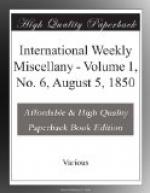of their immediate progenitors; and unless some Manhattanese
scholiast should write a commentary on the poem in
time, its allusions, and with them most of its wit,
will be in danger of perishing entirely. What
we
can judge of in
Fanny are one or
two graceful lyrics interspersed in it, though even
these are marred by untimely comicality and local
allusions. The nominal hero, while wandering
about at night after the wreck of his fortunes, hears
a band playing outside a public place of entertainment.
It must have been a better band than that which now,
from the Museum opposite the Astor House, drives to
frenzy the hapless stranger.... In Halleck’s
subsequent productions the influence of Campbell is
more perceptible than that of Byron, and with manifest
advantage. It may be said of his compositions,
as it can be affirmed of few American verses, that
they have a real innate harmony, something not dependent
on the number of syllables in each line, or capable
of being dissected out into feet, but growing in them,
as it were, and created by the fine ear of the writer.
Their sentiments, too, are exalted and ennobling; eminently
genial and honest, they stamp the author for a good
man and true,—Nature’s aristocracy....
For some unexplained reason Halleck has not written,
or at least not published, anything new for several
years, though continually solicited to do so; for he
is a great favorite with his countrymen, especially
with the New Yorkers. His time, however, has
been by no means passed in idleness. Fashionable
as writing is in America, it is not considered desirable
or, indeed, altogether reputable, that the poet should
be
only a poet. Halleck has been in business
most of his life; and was lately head-clerk of the
wealthy merchant, John Jacob Astor, who left him a
handsome annuity. This was increased by Mr. Astor’s
son and heir, a man of well-known liberality; so that
between the two there is a chance of the poet’s
being enabled to ‘meditate the tuneful Muse’
for the remainder of his days free from all distractions
of business.
“LONGFELLOW, the pet poet of Boston, is a much
younger man than either Bryant or Halleck, and has
made his reputation only within the last twelve years,
during which time he has been one of the most noted
lions of American Athens. The city of Boston,
as every one knows who has been there, or who has
met with any book or man emanating from it, claims
to be the literary metropolis of the United States,
and assumes the slightly-pretending soubriquet
just quoted. The American Athenians have their
thinking and writing done for them by a coterie whose
distinctive characteristics are Socinianism in theology,
a praeter-Puritan prudery in ethics, a German tendency
in metaphysics, and throughout all a firm persuasion
that Boston is the fountain-head of art, scholarship,
and literature for the western world, and particularly
that New York is a Nazareth in such things, out of
which can come nothing good. For the Bostonians,




